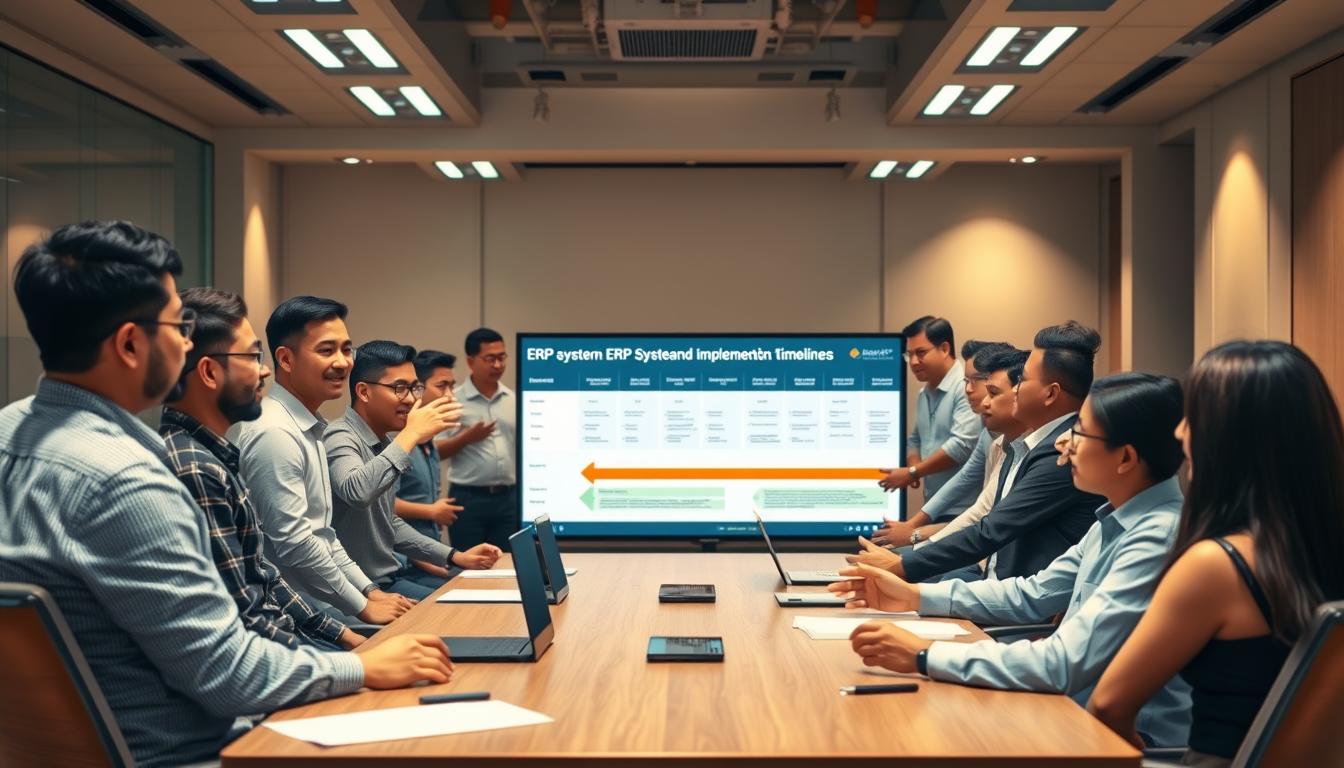Ever wondered why some companies easily move through ERP system upgrades while others face big challenges? Software vendors are key in this process, acting as change leaders. They do more than just sell software; they build a partnership that offers ongoing support and advice.
In the Philippines, small and medium enterprises (SMEs) can greatly benefit from understanding vendor management. This knowledge helps improve operational efficiency and ensures upgrades are successful.
Key Takeaways
- Software vendors play a pivotal role in successful ERP system upgrades.
- Strong vendor management enhances operational efficiency in SMEs.
- Post-implementation support is essential for long-term success.
- Effective upgrades can be a game-changer for business performance.
- Partnerships between companies and vendors lead to better adaptation of technology.
Understanding ERP System Upgrades
ERP system upgrades are key for businesses to stay ahead. They help companies grow and work better in a changing world. These upgrades make businesses more efficient.
Choosing to upgrade instead of buying new is smart for many. It’s cheaper and brings new features without the big cost of a new system. This is great for small and medium-sized businesses with tight budgets.
Upgrades also mean less disruption. Employees can easily get used to new features. This keeps work flowing smoothly and quickly pays off.
ERP upgrades meet today’s business needs. They adapt to a company’s goals. Adding user feedback makes sure the updates work well for everyone.
In short, upgrading ERP systems is a big win for businesses. It boosts efficiency, keeps things running smoothly, and helps companies grow.
The Importance of Software Vendors in ERP Upgrades
Software vendors play a key role in ERP upgrades. They bring the knowledge and experience needed for a successful upgrade. This is very important for small and medium enterprises (SMEs) in the Philippines. Their support makes the upgrade process smoother.
Working with software vendors gives organizations access to many resources. They get best practices and custom solutions that fit their needs. This partnership makes the upgrade process more efficient, reducing disruptions and improving performance. With ongoing support, companies can keep their ERP systems up to date, using new features and improvements.
Choosing a reliable software vendor is also crucial. A good vendor relationship means open communication, which is essential during upgrades. This collaboration helps solve immediate problems and plans for future growth and scalability.
| Benefits of Vendor Support | Impact on ERP Upgrades |
|---|---|
| Access to Expertise | Ensures upgrades meet industry standards and best practices. |
| Customization Options | Enables tailoring the ERP to unique business processes. |
| Training Resources | Helps employees transition smoothly to the new system. |
| Ongoing Support | Provides troubleshooting and optimization post-upgrade. |
Factors to Consider During ERP Upgrade Decisions
When deciding to upgrade your ERP, it’s important to think about several key factors. These factors affect how well the system works and its cost. Knowing these can help avoid problems and make the transition smoother.
Evaluating Current System Limitations
First, you need to find out what your current ERP can’t do. Check if it fits your business needs and supports the functions you need. If it doesn’t, it might slow you down or stop you from growing.
It’s a good idea to get feedback from different parts of your company. This way, you get a full picture of what’s working and what’s not.
Cost-Effectiveness of Upgrading vs. Replacing
Then, you should compare the cost of upgrading versus replacing your ERP. Look at the upfront costs and the potential savings over time. This will help you choose the best option for your company’s future.
Post-Implementation Support: Key Benefits of Software Vendors
After an ERP upgrade, businesses often face challenges. Support from software vendors is key to overcoming these hurdles. This support greatly improves the experience for companies, which is crucial in the fast-paced market of the Philippines.
Enhanced Technical Assistance
One major benefit is the enhanced technical help. Software vendors offer ongoing support to fix any issues after the upgrade. This support helps companies solve problems quickly, keeping operations running smoothly.
Having dedicated technical help means less downtime. It makes the transition smoother. Quick answers to technical questions help businesses use their new systems better, boosting productivity.
Training and User Adoption
Training is vital for users to get used to new systems. Post-implementation support includes specific training sessions. These sessions help employees learn new features confidently.
A well-trained team is less resistant to change. They use new software features effectively. Investing in training shows a company’s commitment to its employees and the system’s success.
How Software Vendors Manage Chaos During ERP Upgrades
ERP upgrades can be chaotic for businesses. Software vendors help make these transitions smoother. They use effective strategies to reduce confusion and keep things running smoothly.
Vendors use centralized governance to manage chaos. This method improves communication and aligns everyone’s goals. It also prevents misunderstandings and keeps information flowing clearly.
They also use project management tools to track progress. These tools help everyone see how the project is doing. Regular updates and feedback sessions make sure everyone knows what’s happening.
These strategies not only reduce chaos but also bring teams together. By involving everyone, decisions are made with more information. This approach helps keep businesses running smoothly during upgrades.
The Role of IT in Collaboration with Software Vendors
IT teams and software vendors working together is key during ERP implementation. This partnership helps make the process smoother and ensures data moves correctly. By teaming up, they can make the transition to the new ERP system better.
Streamlining Implementation Processes
When IT teams and software vendors work together, things run more smoothly. They understand each other’s needs better. This means the software fits the company’s needs perfectly.
Good communication and updates help solve problems early. This approach reduces downtime and speeds up the process. It makes the whole experience better for everyone.
Data Migration and System Integration
Data migration is a big part of ERP implementation. IT experts are crucial for moving data safely to the new system. They make sure the data stays accurate.
Integrating the ERP system with other apps also needs careful planning. IT helps make sure everything works together well. This is important for the system to work well and for employees to use it easily.
Customizing ERP Solutions Through Vendor Support
Businesses need to tailor their ERP systems to fit their unique needs. Vendor support is key in this process. It helps companies make their ERP systems work better for them.
Tailoring Features to Business Needs
ERP customization lets businesses change system features to meet their needs. Vendors help find the right features to boost productivity. They create solutions that make work more efficient and users happier.
- Custom user interfaces for role-based access
- Modification of existing modules to better support workflow
- Development of bespoke reporting tools
Integrating Third-Party Applications
ERP systems also need to work with other apps. Vendor support is crucial for this. It makes the ERP system more powerful by connecting with other tools.
- Enhanced customer relationship management (CRM)
- Improved supply chain visibility
- Streamlined financial processes
ERP customization and vendor support help businesses stay ahead. It’s great for small and medium-sized enterprises in the Philippines. It sets a strong base for growth and change.
Long-Term Vendor Relationships and Their Benefits
Building strong vendor relationships is key for businesses, mainly in ERP. Reliable support is vital for handling system upgrades and maintenance. These partnerships boost performance and open up growth chances in the Philippine market.
Continuous Support and Maintenance
Support from vendors helps solve system problems quickly. This keeps operations running smoothly. It means businesses can focus on their main tasks without tech worries.
This support also leads to long-term benefits. It creates a space for innovation and change.
Future Scalability and Upgrades
Long-term vendor partnerships meet current and future needs. As businesses grow, their ERP systems must too. A dedicated vendor offers insights and updates for smooth adoption of new features.
This forward-thinking approach prepares businesses for growth and market changes. For more on improving business solutions, check out the best CRM software in 2023.
| Benefit | Description |
|---|---|
| Continuous Support | Timely assistance in troubleshooting and updates to minimize operational disruptions. |
| Future Scalability | Provision for upgrades and enhancements to meet the evolving needs of the business. |
| Enhanced Performance | Optimized system functioning leads to improved productivity and better resource management. |
| Innovation Access | Opportunities to implement new features and technologies, contributing to competitive differentiation. |
Examples of Successful ERP Upgrades in the Philippines
In the Philippines, many small and medium enterprises (SMEs) have adopted ERP solutions. They share stories of success. These stories show how upgrading can make operations better and help in making smart decisions.
A local manufacturing firm had trouble with managing inventory and scheduling. They upgraded their ERP system and saw big changes. Lead times dropped, and production efficiency went up by 30%. This shows how upgrading can bring real benefits to SMEs.
A retail company also had issues with customer data and order processing. They got a new ERP system and improved a lot. Order processing times fell by 40%. This shows how ERP can help businesses grow and please customers.
These stories remind us of the positive impact of ERP upgrades in the Philippines. Working with trusted software vendors is key. It helps companies deal with new tech and achieve great results.
Conclusion
Software vendors play a huge role in managing ERP upgrades. They help with the technical side and make sure businesses can handle the upgrade process. With their help, companies can work more efficiently and grow in the long run.
Post-implementation support is also key. It helps businesses get used to new features and ensures everything works smoothly. This support is very important for small and medium-sized businesses in the Philippines.
When looking at ERP strategies, it’s important to think about vendor relationships. The right vendors make upgrades easier and help businesses stay innovative. By focusing on strong partnerships, SMEs can get the most out of ERP systems for lasting success.
FAQ
What are the benefits of upgrading my ERP system rather than replacing it?
Upgrading your ERP system is often cheaper and causes less disruption. It meets your current needs and boosts your ROI. This way, you get the most out of your investment without the hassle of a new system.
How can software vendors assist during the ERP upgrade process?
Software vendors are key in making sure the upgrade fits your company’s needs. They handle vendor relations, offer technical help, and manage the project. This makes the upgrade smoother and more efficient for you.
What should SMEs consider when evaluating their current ERP system?
SMEs should check if their system still meets their needs. Look at any limitations and compare the cost of upgrading versus replacing. This careful planning helps avoid wasting money.
Why is post-implementation support from software vendors important?
Post-implementation support is vital for fixing any issues and training users. It prepares employees to use the new system well. This boosts your team’s efficiency and performance.
What strategies do software vendors use to ensure a smooth upgrade process?
Software vendors use strategies like centralized governance and standardized communication. They also use project tracking tools to manage the upgrade. These steps help reduce confusion and ensure a smooth transition.
How can IT departments collaborate effectively with software vendors during an ERP upgrade?
IT departments are crucial in making the upgrade go smoothly. They focus on data migration and system integration. Working together with vendors ensures a smooth transition and better system performance.
Can software vendors help customize my ERP solution?
Yes, software vendors can help customize your ERP solution. They help SMEs tailor their systems to fit their specific needs. They also integrate third-party apps for flexible and scalable solutions.
What are the long-term benefits of maintaining strong relationships with software vendors?
Keeping a strong relationship with software vendors offers ongoing support and maintenance. This allows businesses to adapt and grow their ERP systems as needed. It ensures timely upgrades and support, leading to success and growth.
Are there real-world examples of successful ERP upgrades in the Philippines?
Yes, many local companies in the Philippines have seen success with ERP upgrades. These examples show how the strategies discussed can be applied. They highlight the benefits of strong ERP solutions and vendor partnerships.



